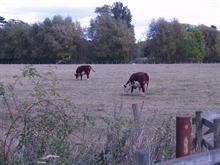Study the care of animals within a permaculture system.
Permaculture is an approach to designing and maintaining sustainable ecosystems, incorporating many different principles such as plants, animals, soils and agriculture.
 Preservation: Use the earth's natural resources to produce a sustainable farming environment.
Preservation: Use the earth's natural resources to produce a sustainable farming environment.
- Sustainability: Study sustainable farming and how animals live within a permaculture system.
- Health: Learn about the nature of natural holistic therapies in treating animals.
- Course duration: 600 hours of self-paced study.
The course comprises 5 Core Modules plus 1 Elective Module to enable students to tailor the Certificate to focus on their own areas of interest.
CORE MODULES
ELECTIVE MODULES
Students are to select 1 module from the following list. If you choose the Permaculture Systems module, you will also gain a Permaculture Design Certificate if you pass this module.
HOW THE COURSE WORKS
You can start the course at any time.
It is studied by distance learning, so you can study in the comfort of your own home. But this doesn't mean you are all alone in your studies. Our highly qualified and friendly tutors are there to help you every step of the way. If you have any questions at all, they are always happy to help.
HOW THE CERTIFICATE IS ASSESSED
The Certificate in Sustainable Animal Science requires around 600 hours of study. This is made up of six 100-hour modules.
To pass the course –
- Pass all assignments on the six 100-hour modules. There will be an assignment at the end of each lesson to submit to your tutor for marking and feedback.
- Pass six examinations – one on each module. These are usually taken at the end of the module and can be arranged at a time and location to suit you.
THE ADVANTAGES OF STUDYING WITH ACS
- You can start the course at any time and study at your own pace.
- Fit your studies around your own busy lifestyle - we provide full tutor support for all the time you are studying.
- Study where you want to - online studies offer the flexibility for you to determine where and when you study.
WHAT NEXT?
Enrol
Go to “It’s Easy to Enrol” box at the top of the page and enrol now.
Get Advice
Email us at info@acsedu.co.uk or use our FREE COUNSELLING SERVICE to contact a tutor.